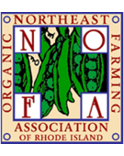 WINTER CONFERENCE March 5, 2017
WINTER CONFERENCE March 5, 2017
8:30 a.m. – 4:30 p.m.
HOPE & MAIN ,
691 Main Street, Warren, RI
POTLUCK LUNCH
—————————
OLC Credits • Exhibitors • Potluck Lunch • Volunteering • Sponsorship
—————————
Our Conference Schedule at a Glance
Workshops and Speakers
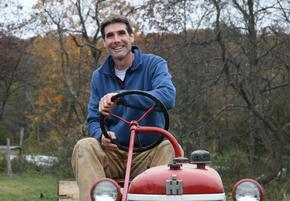
David Hambleton
Balanced Farming – How to Grow a Profitable Farm & a Joyful Life!
David Hambleton, Keynote Address
Sister’s Hill Farm, Standordville, NY.
Do you often find farming overwhelming? Is your life a little lopsided? David Hambleton, a veteran CSA grower, do-it-yourself home builder, athlete, and loving husband and father–will discuss how he has worked to create the life he always dreamed of. He’ll share what he has done to grow a farm business that promotes a life of balance. One not only defined by fulfilling profitable work; but also by having the time and energy to devote to the relationships and activities that bring him the most joy. He’ll share what he has learned through research and practice so that you too can find balance on your farm and in your life!
David Hambleton is a farmer and farm consultant from NY’s Mid Hudson Valley who is passionate about sharing what he has learned in the past 2 decades growing for a 300 family CSA, designing and building his own home, and cultivating a loving and passionate family. His beginner’s mind and DIY design/build ethic have helped him to create a number of unique scale appropriate systems and tools leading to a beautiful and productive farm that keeps customers coming back year after year. He’s a big proponent of strategic farm planning in order to attain not just a profitable farm, but a balanced life!
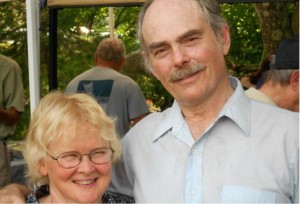
Julie Rawson & Jack Kitrredge
Low Till Gardening Techniques For Carbon Restoration – Round Table.
Jack Kittredge and Julie Rawson of Many Hands Organic Farm and NOFA/Mass will lead a round table discussion on techniques to farm so that your soil continually builds carbon while also producing quality and yield. Growers who are experimenting with farming to build their soil carbon will discuss what works and what doesn’t. Anyone who wants to learn more about how to enhance the life in their soil, build resilience, and sequester carbon is welcome.
Jack and Julie have been certified organic farmers in Massachusetts since 1987 and are active inNOFA/Mass. They edit The Natural Farmer, the quarterly regional newspaper of NOFA.
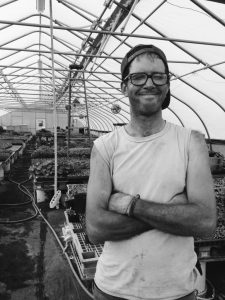
John Kenney
John Kenny, Big Train Farm, Cranston, RI. Owner/manager, joins in the Round Table. Big Train Farm has been certified organic for several years. John has over 15 years of experience as an organic farmer as well as an academic background in biology and chemistry. He will be teaching a “Soil, Plant & Farm Methodology” two day seminar in March.
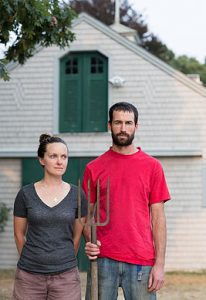
Rachael Slattery & Ben Coerper
Regenerative farming: How a diverse group of livestock can improve your farm’s eco-system.
Ben Coerper & Rachael Slattery, Owners, Wild Harmony Farm, Exeter, RI We will take a look at the relationships between various livestock species, including poultry, cattle, pigs, sheep, & horse and the land they manage, and what farm work is accomplished by putting specific animals in specific places at specific times.
Growing up in Jamestown, Rhode Island, led Rachael to become both a sailor and a farmer. While she’s earned her title as Captain and has yet to stop sailing, she found herself drawn time and time again to the idea of sustainable farming. Rachael works to manage Wild Harmony Farm with Ben.
Ben has worked on farms all over the world and began his own farm so that he could uphold the highest standards of food production. He experienced first hand the health and lifestyle benefits of eating pure natural food and his farm focuses on healthy land, healthy animals, healthy people. Over the past 3 years the farm has grown and maintained Ben’s initial vision and has become a platform from which to educate about the food system. Wild Harmony Farm is the only USDA accredited organic livestock farm in RI.
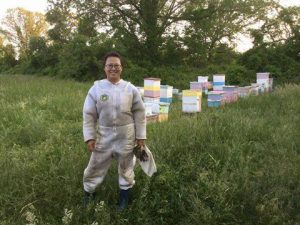
Liyeng Peng
Beekeeping in Sustainable Farming. Liying Peng, P&L Bayside Apiary. Beekeeping has been heavily incorporated into a lot of modern farming. Today’s focus will be on the basics about honey bee biology, current beekeeping delima and sustainable apiary. Participants will also learn about honey tasting and comparison.
Liying Peng, a medical school graduate and emigrant from China, started beekeeping in 2014 and quickly established a pretty impressive record, especially for a newbie. She began grafting raising 60 queens and currently has about 50 hives, 20 of them production with the rest as nucs and one queen-rearing hive, and harvested 700 lbs of honey. Most importantly, she hasn’t lost a hive to CCD. As a beekeeper / scientist Liying incorporates best practices learned from other New England beekeepers and new technology such as incorporating thermal imaging to monitor her hives. Liying is a member of RI Beekeeper Association and was recently featured in the October 2016 American Bee Journal.
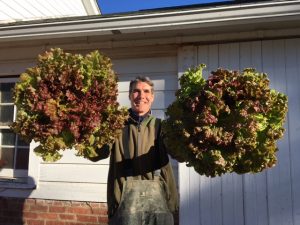
David Hambleton,
Sister’s Hill Farm, NY
Make It Personal: Marketing Your Farm Business Without Gimmicks. David Hambleton, Sister’s Hill Farm, NY. David is here to illustrate how focusing on quality, relationships, and communication of shared values is a much more productive way to run a business than using gimmicks or following market trends. How trying to make your business easier and more convenient to customers, may actually be hurting your relationship with your customers and hurting your bottom line. Come hear about Hambleton’s 20 plus years experience of business success without following market trends!
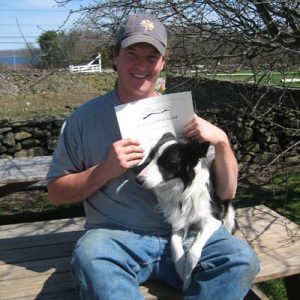
Pat McNiff, Pat’s Pastured Farms, RI
Pastured Poultry – How to improve your land while making a profit with laying hens, meat chickens, turkeys, and ducks. Pat McNiff of Pat’s Pastured Farms, RI.
Pat raises pork, beef, lamb and chicken, plus eggs on leased farmland scattered between North Kingstown and Jamestown. Patrick is still looking for additional land, something that has been a challenge for him and many other farmers in Rhode Island. Pat was awarded the 2010 Farmer of the Year in Edible Rhody’s Local Heros.
Basic Accounting for Famers
Julia Shanks, Julia Shanks Food Consulting, MA
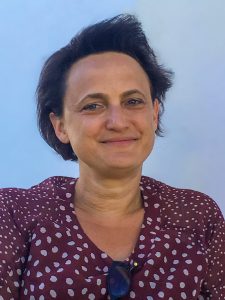
Julia Shanks, Farm Business Consultant
You decided to become a farmer because you love being outside, working the land and making a difference in the way we eat and farm. And when you decided to become a farmer, you also became an entrepreneur and business person. In order to be ecologically and financially sustainable, you must understand the basics of
accounting and book-keeping, and as Richard Wiswall says, “plan for profit.” We’ll review the basics of accounting from the income statement (profit and loss) to the balance sheet. We’ll discuss the importance of classifying revenue and expenses so you can make important managerial decision like whether you can afford a new greenhouse or sell at a new farmers’ market.
Julia, an entrepreneur, author, chef, and urban gardener herself, helps other food and agricultural entrepreneurs achieve and maintain financial sustainability.
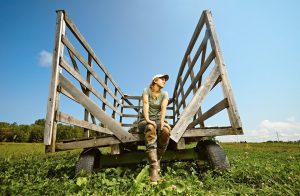
Ashley Loehr,
Sparrowbush Farm, NY
Planning and Growing for a Winter CSA
Ashley Loehr, Sparrowbush Farm, Hudson, NY
Ashley Loehr Sparrowbush Farm. Sparrowbush Farm runs a full-diet 6 month Winter CSA from November through April in collaboration with other producers in Columbia County, NY. The vegetable aspect of the share includes stored, hoophouse, and overwintered crops. In this workshop Ashley will cover the basics of how she plans, grows, stores, and distributes produce for the Winter CSA and share some failures and successes from the last 5 years of Winter farming.
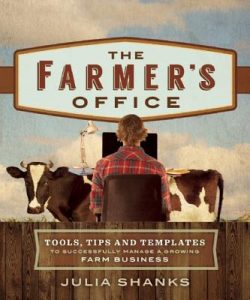 Investment Decisions & Enterprise Budgeting
Investment Decisions & Enterprise Budgeting
Julia Shanks, Julia Shanks Consulting. Have you ever had a hard time weighing the costs and benefits of new opportunities, such as selling at a new farmers market or purchasing new equipment? This workshop on partial budgeting will provide you with a framework for informed decision making. Partial budgeting analysis allows farmers and business owners to assess the costs and impact of an investment decision, such as the purchase of new equipment, a facility upgrade, or a new line of business. Julia will show you how to evaluate whether an investment is affordable given projected returns and provide sample materials to allow you to fully understand how and why to use this tool.
USDA Organic Certification by RIDEM
Matt Green, Rhode Island Department of Environmental Management, Division of Agriculture. Join Matt Green to learn about the organic certification process for Rhode Island farmers as well as the resources and guides available.
Matt Green is an Environmental Scientist. Plant Industry SectionRhode Island DEM Division of Agriculture
Potluck Lunch
Please bring 5-8 servings to share. Limited refrigeration will be available. Suggested offerings are snacks/ appetizers, salads/ sides, hot or cold entrées, and desserts.
NOFA/RI Annual Meeting
Join us for our Annual Meeting. Hear about our programs and efforts in 2016 and our plans for the coming year.
OLC Credits
OLC Credits are Continuing Education Credits are available for NOFA Accredited Organic Land Care Professionals. Print and bring your reaccreditation form for speaker signatures, available here.
Exhibitors
Exhibitor spaces are available. Exhibitor booths include a 6′ table, chair and Conference admission for up to one person with your company or organization.
If you wish to exhibit at the Winter Conference, contact us NOFARI@live.com with your request or contact Jan Martin at (401) 569-8341 (print the Exhibitor Application here.)
| Vendors (selling) | $100 |
| Non-profit organizations (not selling) | $50 |
Registration Guidelines (Register at top of page)
| Adult (Member / Non-Member) | $50 / $60 |
| Beginning Farmer (Member) * | $25 |
| Workshare Volunteers (Member) * | $30 |
| Senior / Student (Member / Non-Member) | $25 / $30 |
| Under 18 | Free |
* Beginning Farmer Scholarships are available for reduced admission as Workshare Volunteers. Beginning Farmers and Workshare Volunteers seeking reduced admission must be current NOFA/RI members. To apply for a Beginning Farmer Scholarship, email us at NOFARI@live.com
Become a Member or renew your Membership here.
Volunteering
Volunteers can help with registration, set up, clean up and logistics. Sign up to volunteer here. We are using an online sign up program that will send reminders to your email. Please note, you don’t have to be a SignUp Genius member to sign up.
Sponsorship
This conference is made possible by our generous sponsors:
the RI Department of Environmental Management’s Division of Agriculture via a USDA Specialty Crop Block Grant,
the Clif Bar Family Foundation (clifbarfamilyfoundation.org), Conference Host, Hope & Main, Farm Credit East, Blount Organics, and Southside Community Land Trust. (makefoodyourbusiness.org)
(makefoodyourbusiness.org)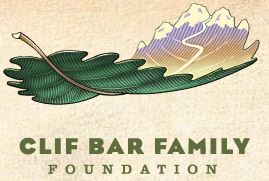

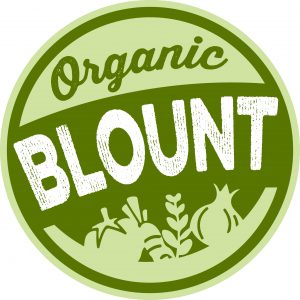
 Learn about Sponsorship and Marketing opportunities here.
Learn about Sponsorship and Marketing opportunities here.
